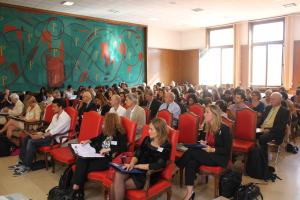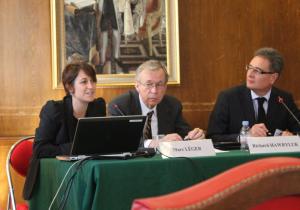Workshop sheds light on complex ITER legal issues
24 Sep 2012
-
Anna Tyler, Assistant Legal Advisor
This legal workshop, held in Aix-en-Provence, was an excellent opportunity to discuss the very complex issues related to the specific legal framework applicable to the project.
Last Friday 21 September, the Director-General of the ITER Organization and the President of Aix-Marseille University opened, together, the first ITER Legal Workshop organized by CERIC (International and European Studies and Research Centre of the Faculty of Law of Aix-en-Provence) in collaboration with the Legal Affairs department of the ITER Organization.
This legal workshop was organized around exchange between the academic world and practitioners involved in the everyday life of the ITER Project; it was a great opportunity to discuss the very complex issues related to the specific legal framework applicable to the project.
Approaches of the academic world and of practitioners revealed to be complementary and fundamental, and this legal workshop enabled all participants to share and confront their experience and outlook for a better understanding of the law applicable to international organizations such as the ITER Organization.
It was also an opportunity to shed light on all the legal issues related to the creation of the ITER Organization and it helped to analyze ongoing and crucial legal issues the ITER Organization is confronted with on a daily basis. In particular, the discussions focused on the specificity of the law applicable to the ITER Organization (question of conciliation between the status of public international organization and the application of French law in certain fields such as nuclear safety, licensing and protection of the environment).
The morning session was devoted to presentations given by distinguished speakers concerning:
- ITER in the framework of international organizations
- The ITER Project and international law
- The ITER Organization and the European Union
- ITER and France.
- ITER in the framework of international organizations
- The ITER Project and international law
- The ITER Organization and the European Union
- ITER and France.
ITER Legal Advisor Laetitia Grammatico, ITER Deputy Director General Rich Hawryluk and Prof. Rostane Mehdi, chair of the morning session.
The afternoon was divided into three panels of discussion composed of ITER staff, scholars and practitioners concerning three different aspects of the ITER Organization's legal framework:
- ITER staff privileges and immunities
- ITER, nuclear and environmental aspects
- ITER and intellectual property rights.
- ITER staff privileges and immunities
- ITER, nuclear and environmental aspects
- ITER and intellectual property rights.
The proceedings of this workshop will be published in order to disseminate the fruitful information shared between all participants. This will be a very important step in writing the legal history of the ITER Project and in spreading information relating to the ITER legal framework.
Prior to the workshop, participants were given the opportunity to visit the ITER site. They were able to see the tremendous progress on the construction and this enabled them to measure the scientific and legal stakes at play and the importance of the ITER Legal Workshop for a better understanding of the ITER Project.
The fact that the workshop was so successful shows the need for further collaboration between the ITER Organization and Aix-Marseille University to explore together legal issues raised by the specific legal status of the ITER Organization.



